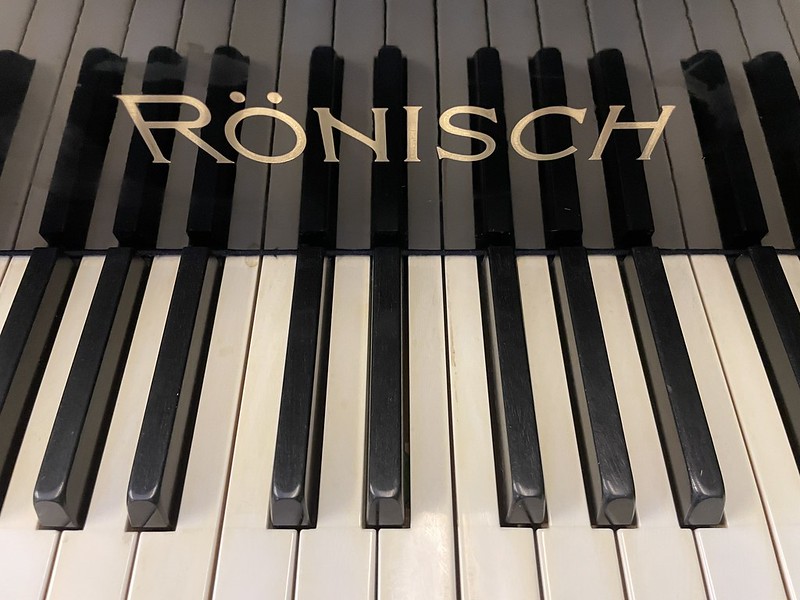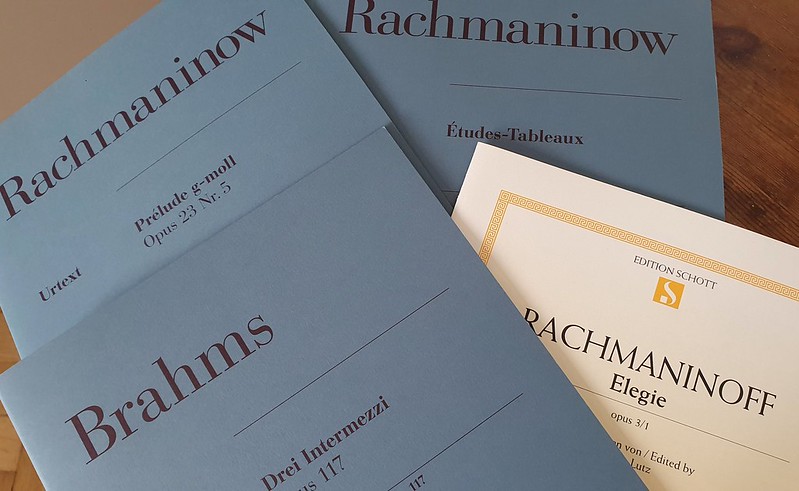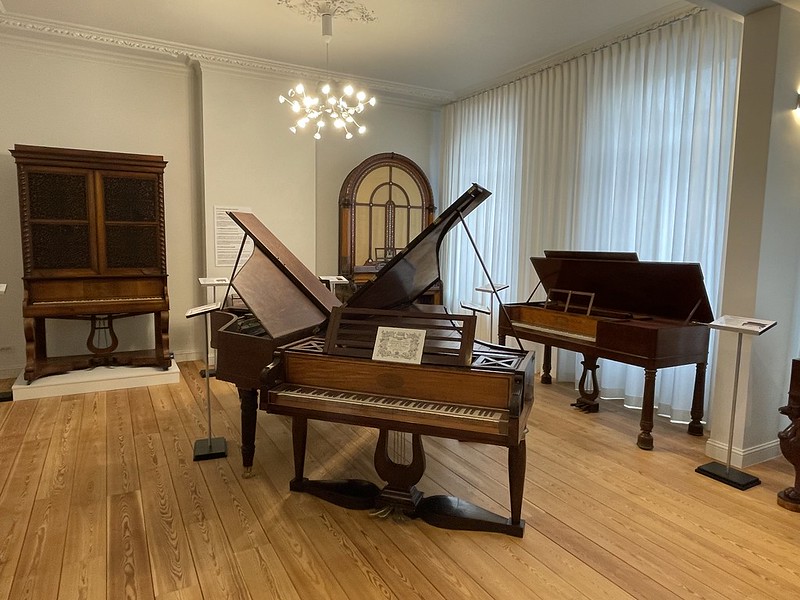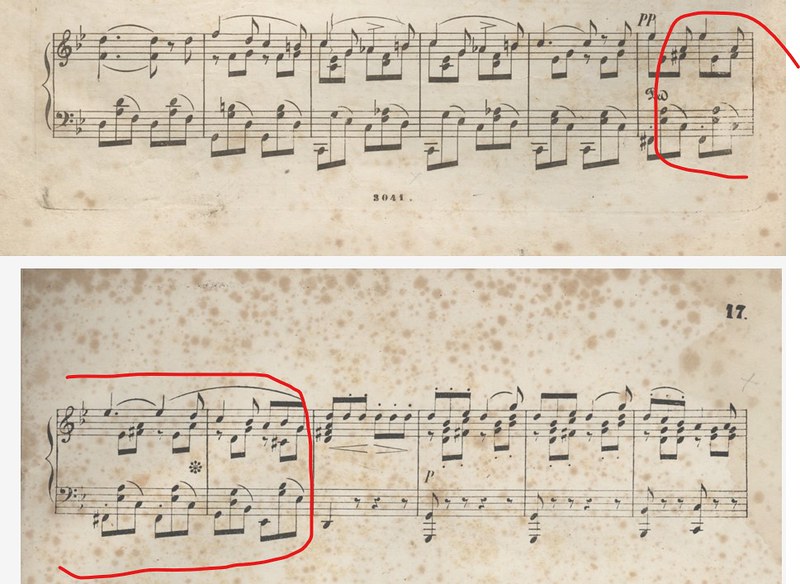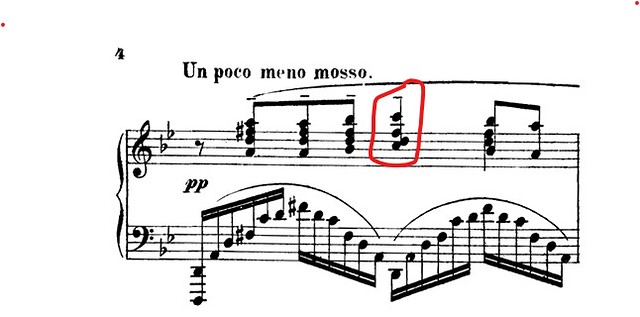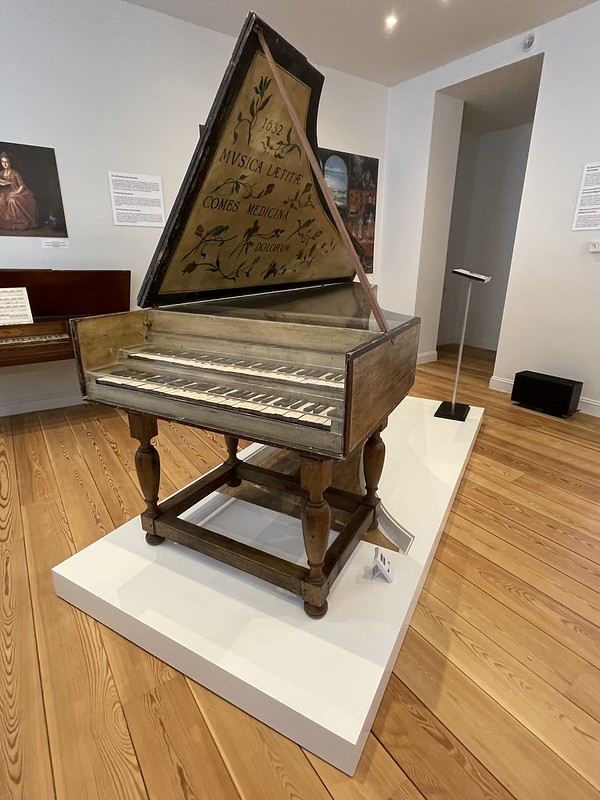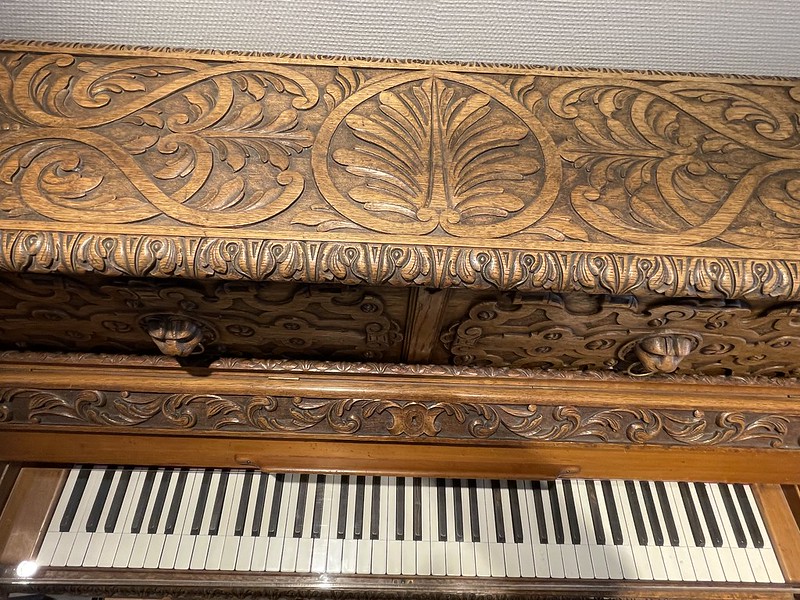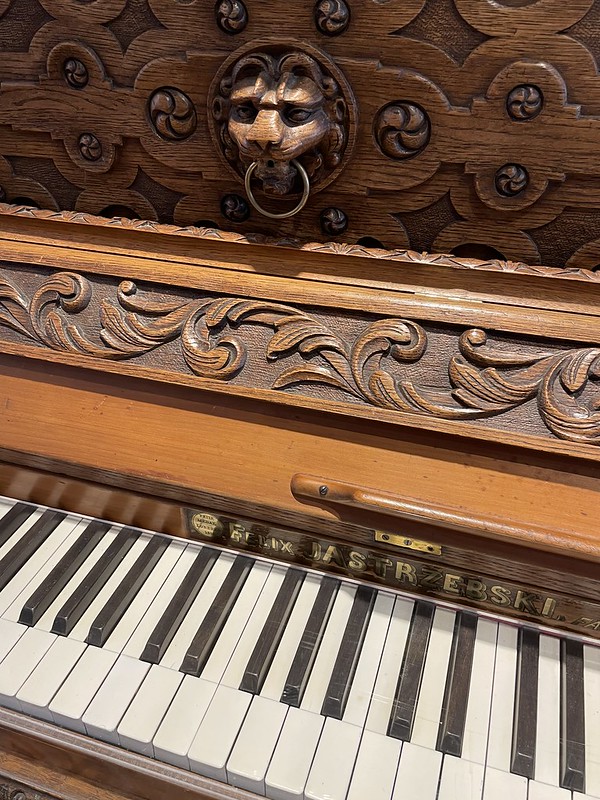I grew up with an English upright that had, I’m told, been restored before it was bought for my sisters. I decorated it myself when I was about five, using the chimney of my dolls house. It had a handy little nail in it which I could use to make marks on polished wood. I drew a house. I had more faith in my art skills at the age of 5 than I did for the subsequent 40 years. And probably more, let’s be honest.
Anyway. My life was upright pianos for most of my childhood. My teacher had an equally old piano; I think it might even have been older than ours, and to be frank, I don’t remember it having a brand. I think the wood had a polished banded pale gold pattery. That there were special pianos knocking around is something I didn’t really realise until I was 13 or 14 and read a book called A Genius at the Chalet School. The genius in question was an orphaned teenager who happened to be a gifted pianist. Her father had died, leaving her to some cousin or other as her guardian. She didn’t really integrate well with the teenage children of her guardian because she was, not to put too fine a point on it, a gifted pianist, and frankly, obsessed, possibly unhealthily so. She was sent to the Chalet School because they would work with the whole piano thing. Her cousins’ school put a limit of two hours on extra curricular activities, of which they considered music to be one. The Chalet School facilitated four hours of practice and ensured she had a decent teacher which was jolly good of them.
Anyway, all of that tedious detail aside, while her father was still alive, some teacher had told her father it was a good time to get her a good piano. He bought her a Bechstein.
I had never heard of a Bechstein but I assumed it was one of those grand pianos I occasionally saw on television. And now, I dreamed of seeing one, maybe even playing one.
It is far from grand pianos I was raised, to use a common put down in Ireland. Moving swiftly onwards. When I was about 15 years old, I went on a trip to London with my cousins and one of the touristy things we did was go to Harrods. They had expensive pianos. Life changingly expensive pianos. I’m not going to go all communist on you and talk about the evils of capital but in 1988, a half sized grand Bechstein in Harrods cost £24,500. I had just coughed up 14% of my total assets at the time on a copy of Rach II in Boosey & Hawkes so a casual piano purchase was off the table.
But the piano was beautiful. It was truly beautiful and they allowed me to play it. I was a lot worse at playing the piano at the age of 14 than I am at the age 50 (stands to reason), but I was able to understand why Nina, the girl in the book, played a Bechstein. It was truly a good piano.
At some point, I will re-write all this into a piece about children’s books that tangentially feature the playing of piano, the fact that they were written in the context of the British class system but that’s not what this story is about. The truth is, a Bechstein in Harrods was the first grand I ever played. My cousins thought I was nuts to touch something that cost as much as a house in Ireland did at the time. Now that I think of it, houses cost more than a Bechstein these days.
Since then, I’m not sure how many grand pianos I have played. I’ve a good idea of the different builders I have played. I’ve played another few Bechsteins, in piano dealers in Ireland, the UK and I think also Germany. In particular I played one of the pianos that occasionally goes to the Royal Albert Hall. It was a beautiful piano, no doubt about it.
Possibly the most beautiful Bechstein I played was not the concert grand in a dealer in London, or the salon sized grand in Harrods, but a rebuild of a piano in a cabinet which I think date from 1882. It’s such a long time since I have seen it, I’m no longer certain of the date. It was in Pianos Plus in Dublin for a good while, and I played it most times that I went there.
But Bechsteins are not common as they used to be. Absent going to a C Bechstein showroom (I think the nearest to me now is the one in Paris which I skipped on a very hot day when I knew my fingers were not going to cooperate), I don’t get a chance to play them very often unless happenstance.
I’m not afraid of asking if I can play a piano in a piano shop and this means I have played quite a lot of pianos depending on opportunity. I spent a couple of years looking for a Fazioli because I had heard so much about them and in the end, went into a dealer in London (I may be dreaming here but I think the same dealer had the concert Bechstein that I played) and found a concert sized Fazioli, had a good with it, and did not get on with it at all. I was surprised and a little disappointed.
I’d heard so much. I can’t exactly explain what didn’t click. Mostly, it’s a question of feeling, how your body responds to the vibrations of the strings. But it was just one of those things. My local piano shop got a brand new salon sized one at some point, and it was a superlative piano. There was maybe only one or two other pianos I have played that were better than it, one is the 1882 Bechstein I mentioned above. The other was, somewhat unsurprisingly a Steinway D.
The plus point about the smaller piano is there’s an outside possibility you could eventually afford one. I still haven’t. The things I loved about the piano included its resonance – notes took an extraordinarily long time to fade away and you could do very interesting things given how sensitive the hammers were. I haven’t played that piano for a few years because I moved away but it’s definitely one of the best pianos I have ever played. Would I buy it? It depends on a lot of things. I don’t think it would be a safe apartment piano for me because I would never be able to give it full welly, as it were.
The very best piano I have played was a 15 year old Steinway Model D.
I’ve been told that if you order a Steinway D, you go to Hamburg to choose your own instrument; I dream of doing this. This, of course, is a totally unworkable dream given that NOWHERE I have ever lived even had a room for this.
In addition to the D, I have played a bunch of other Steinway grands, several Model Os of different ages, a couple of Model Bs and one Model C. When the time and money align, the likely battle could be between a Model B and a similarly sized Fazioli. As this is not the budget zone I am operating in at the moment, I need to temper my desires.
Aside from the Steinways, I have played at least one Boston, also salon sized, I think maybe 2m or the closest size. It’s a beautiful piano but this doesn’t totally surprise me because they are built by Kawai,. and I like Kawai pianos.
I have played quite a few Kawais, including one Shigeru Kawai (beautiful piano but not quite for me). I’ve played various ages from brand new to around 30 years old. I’ve played them in Dublin, Belgium and Luxembourg. Mostly, I have expected that when the time comes, I might find myself with a Kawai, again depending on budget and space. For a while, I preferred the older ones; now it will be a question of an individual piano. They are solid and reliable. They have a beautiful touch. I’m saying this because I have also played Young Changs (not for me) and also, I have played a few Yamahas.
The Yamahas have been an interesting mix. By default, I would say that Yamahas and I do not get on very well. I find them to have a very heavy action in general and I struggle to get a soft note out of them. They are physically more demanding to play than almost every other piano I have ever played. That being said, I have played two really beautiful C3s, one in Germany, one in Ireland. The one in Ireland followed a conversation with the piano salesman in Pianos Plus who told me there was one I should nevertheless have a go with; it had just been voiced by their technician and he had done an exceptional job on it. This was true. At that point in time, that Yamaha was as perfect a piano as I had played at that time in my life (but it couldn’t compete for my heart with the 1882 Bechstein).
Other pianos which I have played include a couple of Schimmels (nice pianos and I would love to visit their factory) and two pianos with French names, an Erard and a Pleyel, both of which I think were built in Germany. I wasn’t, to be honest, all that lost about either of them. They looked the part but did not really feel the part. I also have played a couple of Hanlets, one on French about 30 years ago, and one in Belgium about 25 years ago. They were nice pianos but not life changing.
For a long time, the main “big four” piano that I had not actually tried was Bosendorfer. This is another piano that comes with a huge reputation and I have so far only played one. I did not feel at ease with it and I’d like to play some others, maybe a very big one, and a 1.7 or sized one. I don’t have a Bosendorfer dealer near me so I think this will be a while.
Most recent “new” pianos that I have encountered are a couple of Belgian designed pianos. I’ve played a few Doutrelignes; there are two in the airport in Brussels and if they are free and I have time before my flight, I play them. They are lovely pianos; they have a gorgeous sound and from a keyboard action point of view, they are close to the top in my experience. I occasionally meet one when I hire a practice room at my local piano shop. I like them. Part of the deal with playing some Doutrelignes is that you are in a shop that has a Chris Maene straight strung piano, and yes, I have played it. What I will also say is I would like to play it a lot more. It generates beautiful heart moving vibrations. I needed to be alone with it.
The closest I have come to buying a piano is something I hadn’t previously heard of. I came across a prewar Ronisch. I loved it on first play. I can’t tell you why; it’s a prewar piano which means two pedals and ivory keys. It was not a very big piano but it has a beautiful soul. In a way, I think it reminds me of the 1882 Bechstein I mentioned about 90 minutes ago when I started writing this. I did a little research on the brand when I got home and one of the lovely selling points for me, at least, is that Rachmaninoff used to play one.
The piano itself plays beautifully but that little snippet of information, well “chef’s kiss”. His is now in the Rachmaninoff museum at his old summer house. Such a pity it’s not likely I will get to visit it any time soon. I am still reflecting on this.
And by the way, currently my own piano is a Kawai digital CA59. I love it because it allows me to play any time I like. Even if I eventually buy the Ronisch, or a Steinway B, I will keep it for that pleasure.
Piano dealers of note:
- Kleber Luxembourg
- Pianos Plus Dublin
- Maene Brussels
- Steinway Paris
- Marcus Hubner, Trier
- Jacques Samuel Pianos, London
- Hanlet, Brussels


